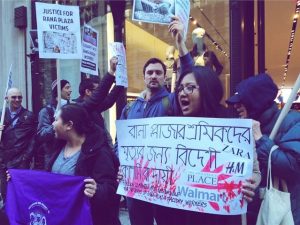Law@theMargins Editor Chaumtoli Huq sat down with five (5) community organizers of Bangladeshi descent to speak about the issues confronting the New York/New Jersey Bangladeshi community, the role of women, and the ways in which we can build women’s leadership and an inclusive movement.
This interview is part of an on going video project to lift up the issues of women, especially working class women, who are organizing for social change in their communities in the United States and globally.
Beginning with the Bangladeshi diasporic community, Law@theMargins seeks your support to raise funds to hold a community organizing workshop, to support local efforts by women to organize, and to support organizing efforts led by women in Bangladesh. Experience has shown that unless we are intentional about cultivating, developing and supporting women’s leadership, and in particular working class women, we will continue to see women’s voices marginalized.
Nahar Alam, founder of Andolon, an organization that organizes South Asian domestic worker shares:
“Women have to come forward and we have to be united.
That’s not for women only, men and our families also have to come forward.”
Bangladeshi community here in the United States and globally present us with an opportunity to envision what might a global grassroots solidarity look like. The emerging leadership of women in the female majority workforce of the garment industry, push out of migrants from rural Bangladesh to urban Dhaka for work and then eventual migration outside of Bangladesh to countries like the United States due to neoliberal economic policies, and War on Terror policies post 9-11 continuing today connects the emergence of women organizing in these places, and we should examine them as inter-related socio-economic processes. As such, when we explore solutions for change while we need to organize locally, our vantage point must remain global.
On imagining global solidarity, and reflecting on the organizing work of garment workers in Bangladesh, DRUM organizer Jensine Sultana shares why this intersectional global analysis is important to our local work:
“It is important to recognize that their struggle is ours. Not only because we are part of the diaspora but also because they are working, women and we are all exploited by capitalism.”
Thus, a project that seeks to connect women organizing in New York City and in Bangladesh seems important to share strategies, vision, and provide mutual support.
Support this project by donating here, and designate the funds for #NareeShongothok https://staging.lawatthemargins.com/support/





